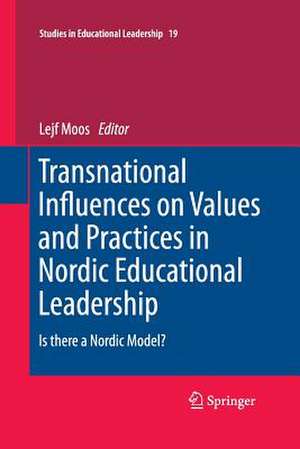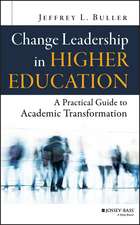Transnational Influences on Values and Practices in Nordic Educational Leadership: Is there a Nordic Model?: Studies in Educational Leadership, cartea 19
Editat de Lejf Moosen Limba Engleză Paperback – 12 apr 2015
The transnational and global discourse on educational leadership is mostly formed according to Anglo-American thinking and tradition. Pivotal foundations of this discourse are strong hierarchical societies/class societies with liberal democracies, and clearly streamed education systems. The Nordic discourse, however, builds on a more equal society and flat hierarchies with participatory democracy, and on comprehensive schooling with strong local community roots. Leadership thinking and practices are formed by the culture and context theyare part of: they are primarily shaped by the national/local values, traditions and practices, and only partially shaped by politics, discourses and literature. Due to the fact that a great deal of the literature that is being used in the Nordic contexts is of Anglo-American origin and many of the research projects have Anglo-American foundations, it is difficult to distinguish the sources for leadership thinking and practice. This book distinguishes the Nordic from the Anglo-American thinking and presents important findings and arguments for leadership practitioners inside as well as outside the Nordic countries.
| Toate formatele și edițiile | Preț | Express |
|---|---|---|
| Paperback (1) | 638.11 lei 6-8 săpt. | |
| SPRINGER NETHERLANDS – 12 apr 2015 | 638.11 lei 6-8 săpt. | |
| Hardback (1) | 644.30 lei 6-8 săpt. | |
| SPRINGER NETHERLANDS – 28 mar 2013 | 644.30 lei 6-8 săpt. |
Din seria Studies in Educational Leadership
-
 Preț: 279.93 lei
Preț: 279.93 lei - 15%
 Preț: 638.76 lei
Preț: 638.76 lei - 18%
 Preț: 947.50 lei
Preț: 947.50 lei - 15%
 Preț: 637.28 lei
Preț: 637.28 lei - 15%
 Preț: 636.12 lei
Preț: 636.12 lei - 15%
 Preț: 635.01 lei
Preț: 635.01 lei - 24%
 Preț: 932.26 lei
Preț: 932.26 lei - 18%
 Preț: 945.47 lei
Preț: 945.47 lei - 20%
 Preț: 559.43 lei
Preț: 559.43 lei - 18%
 Preț: 1104.88 lei
Preț: 1104.88 lei - 15%
 Preț: 637.13 lei
Preț: 637.13 lei - 15%
 Preț: 638.43 lei
Preț: 638.43 lei -
 Preț: 397.59 lei
Preț: 397.59 lei - 15%
 Preț: 660.04 lei
Preț: 660.04 lei - 15%
 Preț: 654.12 lei
Preț: 654.12 lei - 18%
 Preț: 954.45 lei
Preț: 954.45 lei - 24%
 Preț: 701.94 lei
Preț: 701.94 lei - 18%
 Preț: 731.41 lei
Preț: 731.41 lei - 15%
 Preț: 640.88 lei
Preț: 640.88 lei - 15%
 Preț: 640.71 lei
Preț: 640.71 lei - 18%
 Preț: 946.55 lei
Preț: 946.55 lei - 15%
 Preț: 643.34 lei
Preț: 643.34 lei - 15%
 Preț: 645.28 lei
Preț: 645.28 lei - 15%
 Preț: 639.73 lei
Preț: 639.73 lei - 15%
 Preț: 635.31 lei
Preț: 635.31 lei
Preț: 638.11 lei
Preț vechi: 750.72 lei
-15% Nou
Puncte Express: 957
Preț estimativ în valută:
122.10€ • 127.83$ • 101.03£
122.10€ • 127.83$ • 101.03£
Carte tipărită la comandă
Livrare economică 05-19 aprilie
Preluare comenzi: 021 569.72.76
Specificații
ISBN-13: 9789400796089
ISBN-10: 9400796080
Pagini: 248
Ilustrații: XX, 228 p.
Dimensiuni: 155 x 235 x 13 mm
Greutate: 0.35 kg
Ediția:2013
Editura: SPRINGER NETHERLANDS
Colecția Springer
Seria Studies in Educational Leadership
Locul publicării:Dordrecht, Netherlands
ISBN-10: 9400796080
Pagini: 248
Ilustrații: XX, 228 p.
Dimensiuni: 155 x 235 x 13 mm
Greutate: 0.35 kg
Ediția:2013
Editura: SPRINGER NETHERLANDS
Colecția Springer
Seria Studies in Educational Leadership
Locul publicării:Dordrecht, Netherlands
Public țintă
ResearchCuprins
Contributors.- Forewords by John MacBeath, Peter Mortimore, Jim Spillane and Philip Woods.- 1. Prelude – Tuning the Instrument; Lejf Moos.- Part 1. Country Cases. 2. Denmark: New Links between Education and Economics; Lejf Moos, Klaus Kasper Kofod, Katrin Hjort & Peter Henrik Raae.- 3. Educational Leadership in Finland – or Building a Nation with Bildung; Michael Uljens and Cilla Nyman.- 4. Transnational Influence and Educational Policy in Iceland; Börkur Hansen.- 5. Norway: Centralisation and Decentralisation as Twin Reform Strategies; Jorunn Møller and Guri Skedsmo.- 6. Sweden: Centralization and Decentralization as Implementation Strategies; Mikael Holmgren, Olof Johansson & Elisabet Nihlfors.- Part 2. Thematic Chapters.- 7. Independent Schools in Different Nordic Contexts – Implications for School Leadership?; Pia Skott and Klaus Kasper Kofod.- 8. Leadership for Democracy; Lejf Moos, Börkur Hansen, Göran Bjørk & Olof Johansson.- 9. The Professionalization of Nordic School Leadership; Michael Uljens, Jorunn Møller, Helene Ärlestig & Lars Frode Frederiksen.- 10. Successful Nordic School Leadership; Lejf Moos, Olof Johansson & Guri Skedsmo.- 11. Local Decisions under Central Watch - A New Nordic Quality Assurance System; Olof Johansson, Elisabet Nihlfors, Mikael Holmgren, Lejf Moos, Guri Skedsmo, Jan Merok Paulsen & Mika Risku.- 12. The Nordic Superintendents´ Leadership Roles: Cross National Comparison; Elisabet Nihlfors, Olof Johansson, Lejf Moos, Jan Merok Paulsen & Mika Risku.- 13. Postlude – Wrap up of the Argument; Lejf Moos.- Author Biographies.
Textul de pe ultima copertă
This book explores to what extent transnational influences change national/local values and practices in the Nordic educational systems. It provides country cases and thematic chapters that give nuanced insights into the influence of transnational agencies on national governance and discourses. It describes how national discourses and regulation influences school leadership values, culture and practice, in competition with traditional values.
The transnational and global discourse on educational leadership is mostly formed according to Anglo-American thinking and tradition. Pivotal foundations of this discourse are strong hierarchical societies/class societies with liberal democracies, and clearly streamed education systems. The Nordic discourse, however, builds on a more equal society and flat hierarchies with participatory democracy, and on comprehensive schooling with strong local community roots. Leadership thinking and practices are formed by the culture and context they are part of: they are primarily shaped by the national/local values, traditions and practices, and only partially shaped by politics, discourses and literature. Due to the fact that a great deal of the literature that is being used in the Nordic contexts is of Anglo-American origin and many of the research projects have Anglo-American foundations, it is difficult to distinguish the sources for leadership thinking and practice. This book distinguishes the Nordic from the Anglo-American thinking and presents important findings and arguments for leadership practitioners inside as well as outside the Nordic countries.
The transnational and global discourse on educational leadership is mostly formed according to Anglo-American thinking and tradition. Pivotal foundations of this discourse are strong hierarchical societies/class societies with liberal democracies, and clearly streamed education systems. The Nordic discourse, however, builds on a more equal society and flat hierarchies with participatory democracy, and on comprehensive schooling with strong local community roots. Leadership thinking and practices are formed by the culture and context they are part of: they are primarily shaped by the national/local values, traditions and practices, and only partially shaped by politics, discourses and literature. Due to the fact that a great deal of the literature that is being used in the Nordic contexts is of Anglo-American origin and many of the research projects have Anglo-American foundations, it is difficult to distinguish the sources for leadership thinking and practice. This book distinguishes the Nordic from the Anglo-American thinking and presents important findings and arguments for leadership practitioners inside as well as outside the Nordic countries.
Caracteristici
Compares thinking and practice across all Nordic educational systems Links transnational trends and tendencies to national governance and discourses Analyses contemporary features in educational leadership in different national contexts









